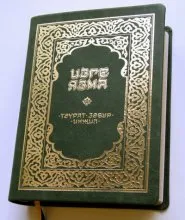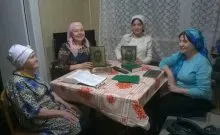
Here is a striking story from a Tatar pastor, who recognizes the importance of IBT Bible translations and uses them abundantly in his life and ministry.
“When I first got acquainted with the Bible, it was the Bible in Russian of course. And I had already been used to reading the Bible in Russian by the time the Injil in Tatar was presented to me. As I started reading the Gospels in the language that was my own one since early childhood, I felt that Jesus himself was addressing me personally. After this experience I wanted to say to all Bible translators, “What you do is extremely significant, you are providing an opportunity for God Himself to address people in their mother tongue!” But as for me, Tatar is my mother tongue, and my situation could have been expected, but here is an even more striking example: I was sharing the Gospel with my friend, who does not know the Tatar language well enough to speak it in his daily life, though he is Tatar ethnically. He normally speaks Russian. I read aloud the Parable of the Prodigal Son from the Gospel of Luke in Russian. He listened with interest, but did not seem deeply touched by what he heard. Then I took out the Injil and started reading the same passage in Tatar. As soon as I reached the place where the forgiving father addresses his elder son with the word ulym (“my son”) in Tatar, tears gushed from his eyes and he wept for a long time. This single Tatar word touched some of the innermost strings of his soul and caused the deepest impression upon him”.
“The Tatar situation is quite specific. On the one hand, Tatars know Russian better than any other people group of the former Soviet Union. The majority of the people, who live in cities, know it better than they know Tatar. Therefore many people think that there is no use in translating the Bible into Tatar. Why should it be done, they ask, if people can read it in Russian and understand it even better than in their national language? On the other hand, Tatar people feel on the genetic level that the Bible in Russian is part of an alien culture.”
Here it is important to explain that historically relations between the Russian and Tatar peoples have never been easy, and as anywhere in our world, whenever historical memory becomes the highest priority, then old offenses and stereotypical views inevitably block the living and ever-changing reality. Any Russian person remembers the Mongol-Tatar invasion of Rus’ in the 13-15th centuries. Any Tatar person remembers that their capital city Kazan was conquered by the Russians in the 16th century. Historical memory compels Tatars to see in Christianity the religion of the conquerors.
That’s why, the Tatar pastor continues, “it’s a widely spread opinion among Tatars that to read the Bible in Russian is like turning yourself into a Russian. This makes sharing the Bible with the Tatar people an amazingly difficult task.”
“Tatars enjoy having something on the walls of their houses,” the Tatar pastor continued, “and we decided to make calendars with Bible quotations in Tatar. We made our first calendar in 2012, and immediately it became very popular. Paradoxically, we got a lot of requests to translate the Biblical text in the calendar into Russian and publish the calendar as a diglot! Many Tatars do not want to read Biblical texts in Russian, but they do not understand them in Tatar, so what they want is to see the Tatar “original” with the Russian translation! This is the paradox that helped to overcome the psychological barrier. We therefore published Biblical calendars with the Tatar text in big letters and the Russian text in small letters. And in 2015, on the eve of the full Tatar Bible publication, we asked IBT to publish the Gospel of John as a Tatar-Russian diglot. The Tatar text was taken from the new translation of the Bible. The Russian text was taken from the special Central Asian Russian Scripture translation made for Muslims. We required a print run of 5,000 copies. Both IBT and the organization that held the copyright to the Russian translation were afraid that the book would stay in a warehouse covered with dust. But to the contrary, the entire print-run was distributed at once and we constantly get good feedback on it from the readers. The book has definitely found its reader and more books of this sort are needed!”

IBT Russia/CIS is a non-profit organization financed through contributions from individuals, sponsoring organizations and foundations.
You can donate to IBT:
Through: AO UniCredit Bank, Moscow
SWIFT: IMBKRUMM
In favour of: Institute for Bible Translation
Address: 119334, Russia, Moscow, Andreevskaya nab. 2
TIN (INN) 7736231521
9-digit Bank identification code in Russian banking system: 044525545
Account no. (IBAN):
634261 USD 4020 02 001 or 40703840700010142881
634261 EUR 4020 02 001 or 40703978700010366720
634261 GBP 4020 02 001 or 40703826600010366723
Through: NOSTRO ACCOUNTS OF AO UNICREDIT BANK, MOSCOW:
USD JPMORGAN CHASE BANK N.A., NEW YORK SWIFT CODE: CHASUS33
EUR UNICREDIT BANK AG (HYPOVEREINSBANK) , MUNICH SWIFT CODE: HYVEDEMM
EUR UNICREDIT BANK AUSTRIA AG, VIENNA SWIFT CODE: BKAUATWW
EUR UNICREDIT S.P.A., MILANO SWIFT CODE: UNCRITMM
GBP THE ROYAL BANK OF SCOTLAND PLC, LONDON SWIFT CODE: RBOSGB2L
Important! In the field "designation" write "CHARITY DONATION"
For more information address IBT
You may sign up to receive our Russia/CIS monthly English newsletter here
